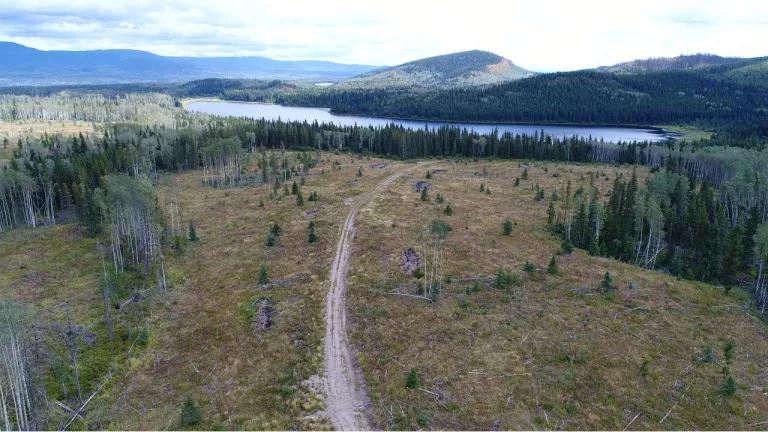For Earth Day, A Growing Chorus Calls on P&G to Take Action
On the eve of Earth Day, consumers delivered an overwhelming message to Procter & Gamble (P&G): stop flushing away the world’s last remaining primary forests.

Clearcut logging in Ontario
On the eve of Earth Day, nearly 500,000 consumers delivered an overwhelming message to multinational consumer goods company Procter & Gamble (P&G): stop flushing away the world’s last remaining primary forests. P&G’s sourcing from these never-before-logged areas for products like Charmin toilet paper and Bounty paper towels has faced mounting criticism in recent years for being fundamentally at odds with biodiversity needs and global climate goals. Now, recent developments show that P&G’s practices aren’t just out of alignment with climate science, but that the company is increasingly falling out of sync with a marketplace moving toward urgent action to protect the world’s last remaining primary forests.
Today, NRDC and its partners Environment America, Friends of the Earth, and Rainforest Action Network, sent almost half a million petition signatures to P&G CEO Jon Moeller calling on him to take immediate action to eliminate deforestation and primary forest degradation from the company’s supply chains. These petitions, gathered over the last three years, are a testament to the rising tide of criticism P&G faces as its forest sourcing remains mired in outdated, unnecessary, and unsustainable practices.
This call for P&G to take action was echoed by last month’s seismic shift in how one influencer ranks brands and recommends toilet paper. In their 2022 “Best Toilet Paper” picks of the year, New York Times’ Wirecutter chose Seventh Generation’s more sustainable and more affordable (yet still “super-soft, low lint”) option of 100% Recycled Extra Soft & Strong Bath Tissue as its "new favorite" relative to Charmin. Seventh Generation’s toilet paper earned an “A” grade in NRDC’s 2021 Issue with Tissue scorecard given the lower carbon footprint and overall reduced forest impact associated with its 100% post-consumer recycled content. While Charmin clings to its claim that recycled materials create inferior products, Wirecutter’s update belies the notion that making tissue products from virgin fiber is a necessity for consumer preference.
As the marketplace shifts towards greater sustainability, P&G remains entrenched in many of the same globally harmful sourcing practices that have resulted in the company receiving a slew of negative media coverage. These practices include turning trees from the Canadian boreal – the world’s largest, most carbon-rich intact forest – into throwaway tissue products, while simultaneously failing to implement the necessary safeguards for protecting threatened species habitat and ensuring the right to free, prior, and informed consent of Indigenous Peoples.

Rally attendees at P&G's 2019 shareholder meeting call for the company to stop flushing forests
For years now, Indigenous leaders, NGOs, investors, faith leaders, and concerned citizens from around the world have written to P&G leadership asking the company to address its impacts on primary forests. In 2019, more than 135 groups signed a letter asking P&G leadership to stop turning Canada’s oldest trees into toilet paper. Since then, Procter & Gamble family heirs publicly stated that the company's "production is coming at a terrible price to the planet,” while, in P&G’s own backyard, students at the University of Cincinnati have called out the company’s unsustainable practices.
P&G’s sourcing has also come under fire by a financial sector increasingly seeking to address the risks associated with supply chains fueling the climate crisis and primary forest destruction. The 2020 investor rebellion by the company’s largest shareholders issued a clear directive that P&G must stop destroying forests for its products. And, more recently, Costco’s investors passed a landmark shareholder proposal by Green Century requiring the company to address the upstream emissions of all products on its shelves – including P&G products – as well as their deforestation impacts. Now, more than ever, P&G’s investors are looking to the company to address its forest footprint.
The growing pressure for P&G to end its ties to deforestation and forest degradation echo broader calls for primary forest protection and global climate action. This includes the recent letter to Prime Minister Trudeau from nearly 100 leading scientists from around the world warning that failing to protect primary forests is incompatible with climate leadership and global climate goals. Increasingly, an international community is highlighting the critical role of forests, including the boreal, as a global climate linchpin.
Several years ago, any one of these developments could have been considered unlikely. Now, however, it seems every few weeks the evidence mounts in the case for holding P&G accountable for flushing our forests. As the tide is rapidly shifting toward corporate responsibility for supply chain impacts, it’s time that P&G start swimming with the tide or risk finding itself asea behind its competition.




